Europe, NATO & EU
International Relations > Regions
In spite of its global decline in the wake of WWII, Europe remains one of the world's most important regions.
European states share similar political systems and they remain highly-developed countries in economic terms despite the shock caused by the global financial crisis of 2008 and the subsequent 2011 sovereign debt crisis.
Europe is also the homeland of the world's most advanced, yet debated, regional integration experiments, namely the European Union. Finally, many European states are NATO members and therefore US allies.
Still, Europe is facing serious challenges today.
The Eurozone Crisis, the continued inflow of migrants and the wave of terrorist attacks have created a sense of social insecurity; and this had a major political impact. These factors have favored the emergence of Eurosceptic movements that criticize the EU for its ineffective action. Many describe it as an instrument of (German) economic imperialism and even questioning its legitimacy.
In 2016, the UK decided to leave the Union. Brexit has caused much uncertainty and has set a precedent that other countries may imitate in the future.
Europe must also deal with various issues abroad.
Ensuring the stability and economic development of Africa is paramount to solve the immigration problem.
Relations with Turkey, a candidate to EU membership and already part of NATO, are deteriorating due to President Erdogan's authoritarian policies.
In traditional security terms, the main concern is Russia. The EU is essentially powerless in this domain, and therefore NATO and the US play a prominent role. Tensions mounted following its unilateral annexation of Crimea in 2014 and the invasion of Ukraine in 2022. This has brought to the fore the problem of dependency on Russia as an energy supplier, and has sparked a renewed effort to modernize Europe's militaries.
Relations with China are also complex. A major trading partner for Europe, its ambitious 'One Belt, One Road' initiative is raising many questions. The project will bring consistent Chinese investment in Europe, but it may also result in a geoeconomic penetration by Chinese firms into the continent.
Europe is thus facing a social and political crisis that will mark it for the years ahead.
Outlook 2021: A New Dawn for the European Union?
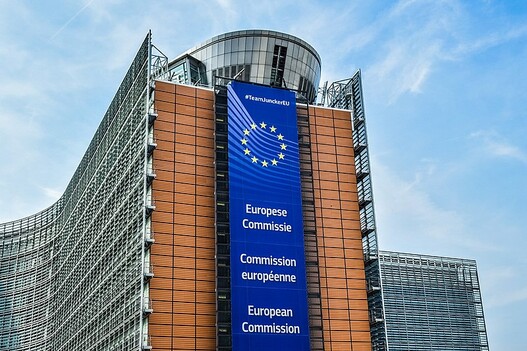 The EU goes into 2021 facing a mixture of opportunities and challenges.
The EU goes into 2021 facing a mixture of opportunities and challenges.The bloc plans to implement an ambitious recovery plan, intended not only to boost growth after the COVID-induced recession, but also to initiate a transition toward a greener and tech-based economic future.
Somehow paradoxically, the pandemic seems to have emboldened rather than downgraded the Commission, which appears determined to carry on its renovation efforts.
Yet the EU remains riddled with complex problems that will persist throughout 2021 and beyond, and it remains to be seen whether Brussels’ react-and-adapt approach will remain viable over the long run.
European Commission, Wikimedia Commons, published under the Creative Commons Attribution-Share Alike 4.0 International license.
NATO Nuclear Sharing: Why it Still Matters
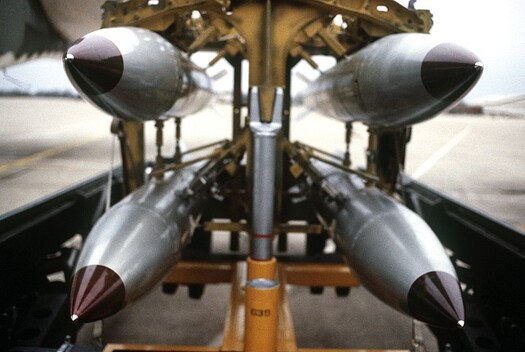 Three decades after the fall of the Soviet Union and the end of the Cold War, NATO’s nuclear sharing program may no longer seem important.
Three decades after the fall of the Soviet Union and the end of the Cold War, NATO’s nuclear sharing program may no longer seem important.But amid renewed tensions with Russia, it remains a fundamental element for the Alliance’s deterrence capabilities. Other than providing an effective and credible tool for nuclear dissuasion, on the political level it represents America’s commitment to defend its European allies.
As such, in spite of challenges ahead, nuclear armaments still represent the ultimate guarantee of NATO’s collective defense mission – to deter war before it begins.
Photo credit: B-61 bomb rack, US Department of Defense (SSGT Phil Schmitten), publushed under public domain.
Nagorno-Karabakh Clashes: Prelude to a Wider War?
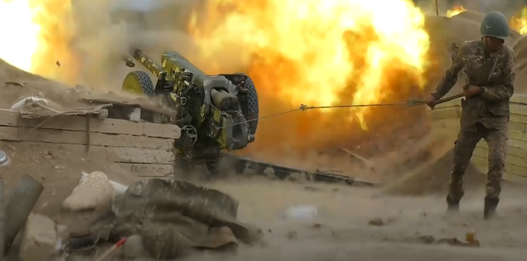 The recent outbreak of armed clashes in Nagorno-Karabakh has reignited a decade-old unsolved dispute. While external powers have generally called for a cessation of hostility and a resumption of talks, France and Turkey have started a diplomatic spat over the issue. France seems keen on supporting Armenia, while Turkey has expressed its determination to back Azerbaijan.
The recent outbreak of armed clashes in Nagorno-Karabakh has reignited a decade-old unsolved dispute. While external powers have generally called for a cessation of hostility and a resumption of talks, France and Turkey have started a diplomatic spat over the issue. France seems keen on supporting Armenia, while Turkey has expressed its determination to back Azerbaijan.In reality, Paris and Ankara were already at odds. They support opposing factions in Libya and recently had a confrontation due to Turkish maritime claims in the Eastern Mediterranean. Moreover, with Armenia being part of the Russian-led CSTO mutual defense pact and pro-Azeri Turkey being a NATO member, there is the potential for the conflict to escalate well beyond Nagorno-Karabakh; a scenario that would look like a repetition of the July Crisis in 1914. Fortunately, due to various factors, this remains a remote possibility.
Photo credit: Defense Army of the Republic of Artsakh attacks Azerbaijan, ԶԻՆՈՒԺ MEDIA, published under Creative Commons Attribution 3.0 Unported.
NATO Arms Sales to Turkey and the Eastern Mediterranean Dispute
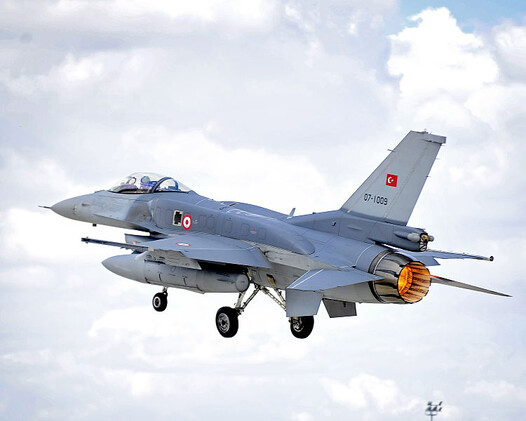 The recent confrontation in the Eastern Mediterranean has highlighted Turkey's readiness to use its military to back its maritime claims - and that of other countries to deploy their forces to counter it.
The recent confrontation in the Eastern Mediterranean has highlighted Turkey's readiness to use its military to back its maritime claims - and that of other countries to deploy their forces to counter it.It has also created growing strains within NATO, as Turkey and other stakeholders like Greece and France are all members of the Alliance.
Yet, NATO countries have been Turkey's main arms suppliers in the past few years, including for strategic assets such as the Type 214 submarines, key systems for the 'Anadolu' landing helicopter dock (LHD) and other warships, Boeing-737 airborne early warning and control (AEW&C) planes, and more.
Amid an increasingly intricated diplomatic context and mounting dissatisfaction inside NATO, these arms sales are poised to become a matter of controversy.
I explore this topic in my latest article on Geopolitical Monitor which you can read here (subscription required).
Photo credit: Turkish Air Force F-16C Block 50 MOD 45157793, SAC Helen Farrer RAF Mobile News Team, published under the Open Government Licence version 1.0 (OGL v1.0).
Belarus Crisis: The Russian Perspective
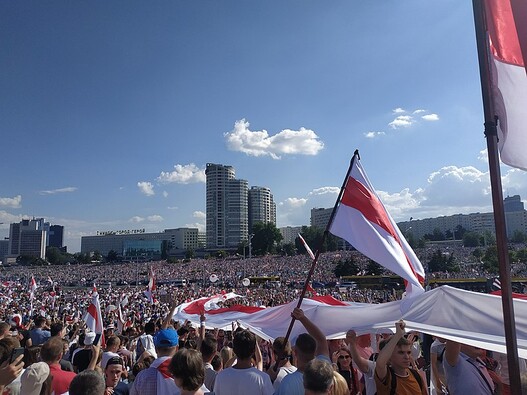 The ongoing political crisis in Belarus has attracted considerable mediatic attention, but it should not come as a surprise. It is the result of decades of poor governance and of a central yet unanswered question: Lukashenko's succession. In a 2018 article (link), I anticipated what could happen in a similar situation, including Russia's possible reaction.
The ongoing political crisis in Belarus has attracted considerable mediatic attention, but it should not come as a surprise. It is the result of decades of poor governance and of a central yet unanswered question: Lukashenko's succession. In a 2018 article (link), I anticipated what could happen in a similar situation, including Russia's possible reaction.Now, amid fears and speculation on the repetition of Ukraine's scenario, I examined the Belarus crisis from Moscow's perspective. Lukashenko has repeatedly resisted its neighbour's preferred course of action, but the country holds a significant importance for Russia's security and the Kremlin wants to keep it in its sphere of influence. A Crimea-like operation will not be easy, since it was largely enabled by the peninsula's geography and by the presence of a large Russian base there. But if Belarus were to tilt excessively towards the West, then it is virtually certain that Moscow will act to preserve its influence over the country - including by using its military forces.
Photo credit: Protest actions in Minsk (Belarus) near Stella, August 16, Maksim Shikunets (Максим Шикунец), published under Creative Commons Attribution-Share Alike 4.0 International.
NATO’s Europe Redeployment: Political Opportunism or Sound Military Strategy?
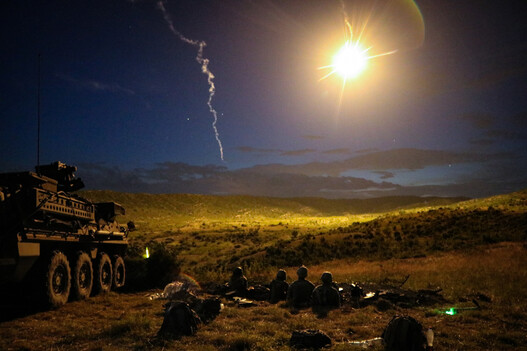 Trump's decision to withdraw significant US forces from Germany has raised much criticism and sparked an intense debate, with critics saying that it undermines NATO's deterrence capabilities.
Trump's decision to withdraw significant US forces from Germany has raised much criticism and sparked an intense debate, with critics saying that it undermines NATO's deterrence capabilities.In my latest contribution to Geopolitical Monitor I examine this issue from a military-strategic viewpoint. Was it a strategically-sound or rather a politically-driven decision? Are concerns about its effect on NATO's mission legitimate?
China Pops Up on the NATO Threat Radar
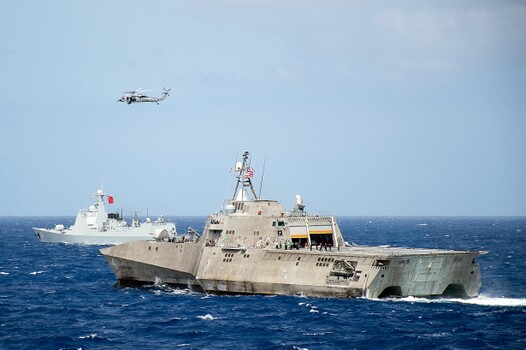 The great geographical distance may let you think that the rise of China is not a matter of concern for NATO.
The great geographical distance may let you think that the rise of China is not a matter of concern for NATO.But in reality, the PRC's growing power has deep strategic implications for North Atlantic security - and the Alliance is well aware of this, as it explicitly stated with the London Declaration of December 2019.
Photo credit: USS Coronado (LCS 4) and the People's Liberation Army (Navy) guided-missile destroyer Xian transit in formation, US Navy, published under Creative Commons Attribution 2.0 Generic (CC BY 2.0).
How Russian Media Is Covering The European Elections
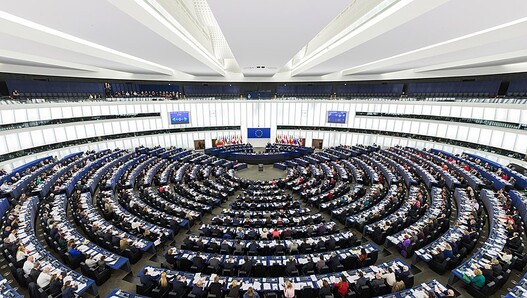 Just a few days ahead of the elections to renew the European Parliament, there is much debate about alleged Russian interferences in the democratic process.
Just a few days ahead of the elections to renew the European Parliament, there is much debate about alleged Russian interferences in the democratic process.But apart from alleged cyber-attacks and other covert activities, how do Russian state-sponsored media outlets in English cover the upcoming elections?
To answer this question, I examined the articles on the EP elections published on RT, Sputnik News and Russia Insider during the past week. While this is has not the ambition of being a fully-comprehensive study, it still allows to recognize a recurring pattern that reveals the objectives of Russia's mediatic strategy.
Read the article on Eurasia Review.
Photo credits: European Parliament Strasbourg Hemicycle, Diliff, published under Creative Commons Attribution-Share Alike 3.0 Unported.
Geopolitics of Brexit
 Brexit is one of the most debated geopolitical issues of our time.
Brexit is one of the most debated geopolitical issues of our time. More than two years after the referendum that resulted in the decision to leave the EU, it is still unclear what the parting conditions will be like.
With such high degree of uncertainty, it is difficult to foresee how things will eventually unfold, but one thing is certain: Brexit will have a significant impact on the UK in the years to come.
This video by KJ Reports, to which I contributed, provides an overview of Brexit and it potential geopolitical consequences. Watch it by clicking here.
Will Italy Leave the Eurozone?
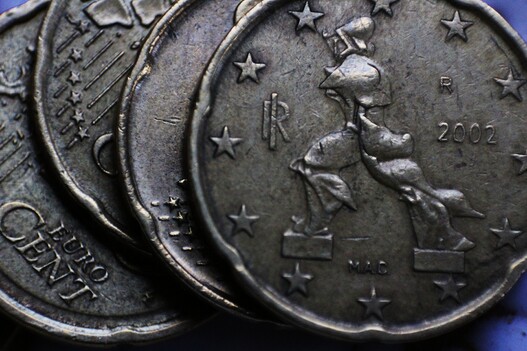 Following a decrease of 0.1% in the third quarter of 2018, Italy’s economy contracted of 0.2% in the final quarter of the same year.
Following a decrease of 0.1% in the third quarter of 2018, Italy’s economy contracted of 0.2% in the final quarter of the same year. As such, Italy is now officially in technical recession; just when it seemed to be recovering from the effects of the debt crisis.
This has sparked an intense political debate and has cast doubts over its economic prospects.
But what does this actually mean for Italy and the EU?
EU Takes Aim at Rule of Law Violators
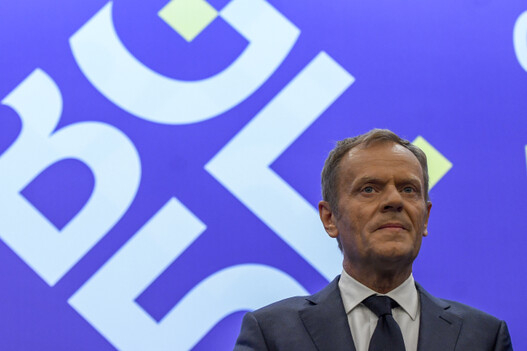 In January 2019, the European Parliament approved (with many amendments) a proposal for a Regulation that would enable the EU to suspend funding to a Member State if it doesn't respect the rule of law. As the time of this writing, the legislative procedure is still ongoing and act is now to be discussed by the Council.
In January 2019, the European Parliament approved (with many amendments) a proposal for a Regulation that would enable the EU to suspend funding to a Member State if it doesn't respect the rule of law. As the time of this writing, the legislative procedure is still ongoing and act is now to be discussed by the Council. While the primary objective seems to ensure that EU funds are properly used, some fear this may become a new instrument to punish violations of the Union's Fundamental Values. This comes in a context where Poland and Hungary have both been accused of not respecting the rule of law, to the point that the sanctioning procedure based on Article 7 has already been activated on them. But what will be the impact of this new measure?
To know more about this topic, read my article on Geopolitical Monitor (subscription required).
Photo credit:Statement by Donald Tusk, President of the European Council, ahead of the EU - Western Balkans Summit, Nikolay Doychinov (EU2018BG), published under Creative Commons Attribution 2.0 Generic (CC BY 2.0).
Outlook 2019: More Struggles Ahead for the EU
 For the European Union, 2019 will be a difficult year.
For the European Union, 2019 will be a difficult year. The exact terms of Brexit are still unclear; Italy has turned to Euroscepticism; Germany and France are experiencing domestic troubles, the V4 countries engaged in disputes with the EU, Greece is going to renew its Parliament while still struggling to recover from the financial crisis and Spain is focused on domestic issues.
No one seems in the condition to lead a reform of the EU; and only a few months ahead of the European Parliament elections, many are raising doubts over the legitimacy and the fundamental values of the European Institutions.
Read my forecast on Geopolitical Monitor (subscription required) to know more about the trends that will influence the EU throughout 2019.
Italy's Role in Europe
 Italy is facing a delicate political and economic situation.
Italy is facing a delicate political and economic situation.Once a centre of the Western Civilization, it gradually lost its centrality throughout the centuries. More recently, it plunged in a severe recession following the global financial crisis, and it has shown signs of recovery only in the past few years.
Yet, it remains the Eurozone’s third largest economy and fourth in the EU as a whole, and it remains one of the most influential countries in the Union, of which it has been a supporter for decades.
However, the current coalition government formed by the Five Star Movement and the League is casting doubts over Italy’s commitment to the EU, and notably over its budgetary rules. This in turn raises concerns over its own economic recovery and also on the tenure of the EU as a whole, which is caught between two diverging views of European integration.
Will Brexit Open the Door for an EU Army?
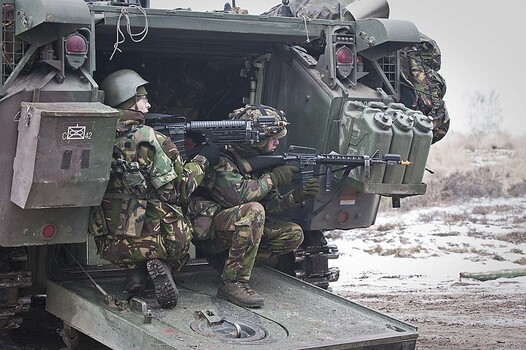 In the last weeks on November 2018, Brexit and Macron's call for a 'EU Army' have been among the most debated issues in the media. Yet, they have been discussed as two separate issues, with very (if any) attention at what is the link between them.
In the last weeks on November 2018, Brexit and Macron's call for a 'EU Army' have been among the most debated issues in the media. Yet, they have been discussed as two separate issues, with very (if any) attention at what is the link between them. In this article for Geopolitical Monitor, I examine Britain's role in the CSDP (Common Security & Defence Policy) and the effects of Brexit on it and on the possibility of creating a unified "EU Army".
Link here (subscription required).
Photo credits: Militairen-nemen-de-verdediging-van-een-ypr-pantserrupsvoertuig-voor-hun-rekening, Ministerie van Defensie (Dutch Ministry of Defense), published under Creative Commons CC0 1.0 Universal Public Domain Dedication.
Will There Ever Be a Common "EU Army"?
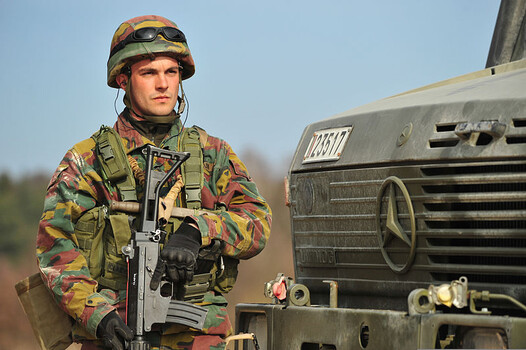 In an era of mounting rivalry between great powers, and with the Trump administration raising doubts over the America’s commitment to protect Europe, the recent declarations by French President Emmanuel Macron over the need of a 'European Army' to protect the continent against Russia, China and even the United States have caused much political debate.
In an era of mounting rivalry between great powers, and with the Trump administration raising doubts over the America’s commitment to protect Europe, the recent declarations by French President Emmanuel Macron over the need of a 'European Army' to protect the continent against Russia, China and even the United States have caused much political debate. But will there ever be a European Union Army?
Photo credit: Belgian soldier during Rampant Lion, EU Battlegroup 2014 II exercise in Grafenwoehr, Germany, Markus Rauchenberger, published under public domain.
Is the European Union On The Edge Of A Civil War? - Article & Video
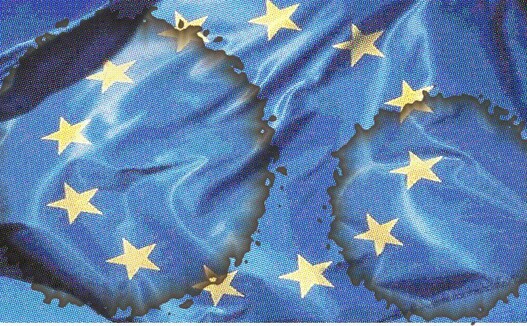 Is the European Union on the Edge of a Civil War?
Is the European Union on the Edge of a Civil War?A simple question, yet a rather shocking and dreadful one.
If we observe the current status of the EU, its future appears uncertain at best. Brexit is unfolding. A trade conflict with the US is looming. Social tensions are growing due to the combined effects of the debt crisis and of immigration flows from extra-EU countries. Consensus is lacking over the evolution of the common institutions, and anti-EU political forces are on the rise all over the continent (the new Italian government is just the latest example and probably strongest expression of this trend).
In such a context, it seems that the Union is destined to be more and more divided, to the point that French President E. Macron stated that the EU is experiencing a "civil war" over its fundamental values.
This prompted me to raise the provocative question. And interestingly, if we observe the past, we can see that the situation of today's EU is strikingly similar to that of another "Union"; namely the United States at the eve of the War of Secession. Will the EU also plunged into civil war, as the US did in the 1860s?
EU: “Ever Closer Union” Hits a Wall with the Visegrád Four
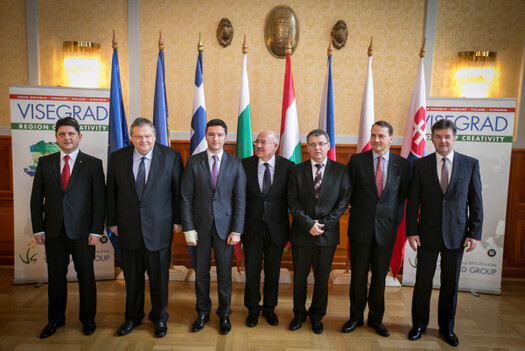 Viktor Orban's re-election as PM in Hungary and Macron's "civil war" statement are both indicators of the diverging visions on the EU: one in favor of more integration, the other wanting to protect the core sovereign rights and the national identity of member states. The latter is embodied by the four countries forming the Visegrád Group, whose influence in European affairs is increasing.
Viktor Orban's re-election as PM in Hungary and Macron's "civil war" statement are both indicators of the diverging visions on the EU: one in favor of more integration, the other wanting to protect the core sovereign rights and the national identity of member states. The latter is embodied by the four countries forming the Visegrád Group, whose influence in European affairs is increasing. Now, beyond the politicized discourse surrounding the V4 states, the existence of these diverging visions is a fact. Both are legitimate and present their pros and cons. Moreover, behind the vision supported by the Visegrád countries there are precise historical causes and geopolitical factors; which must be taken into account to understand their stance.
Photo credit: Foreign ministers of the Visegrad Group discuss Ukraine 11, Poland's Ministry of Foreign Affairs, published under Creative Commons Attribution-NoDerivs 2.0 Generic (CC BY-ND 2.0).
The Catalan Independence Referendum: History, Politics and International Law Interplay
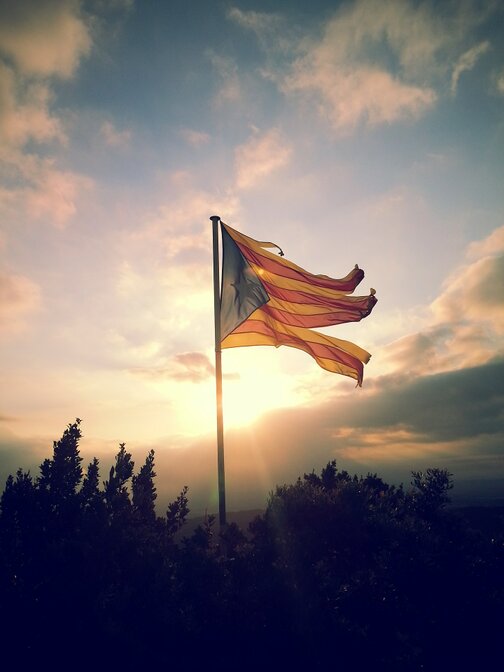
This long comment focuses on the independence referendum in Catalonia held on October 1st 2017, an event that attracted significant attention by the media, especially after the moves by the Spanish central government to block it.
The aim of this article is not to examine the political debate around it in Spain and in Europe, to assess its economic impact, and even less to determine “who is right” and whether Catalonia should become independent or not. Instead, what I wish to do is to raise two often neglected but extremely important aspects of the issue, namely the historical roots of the Catalonian separatism and the problem’s nature from the perspective of international law.
